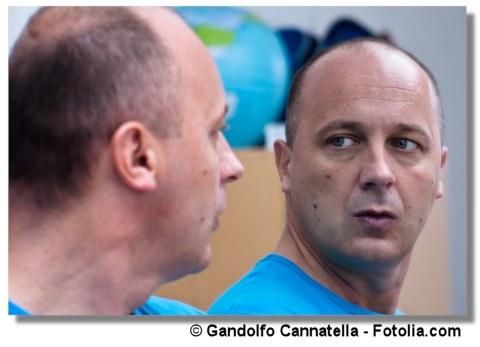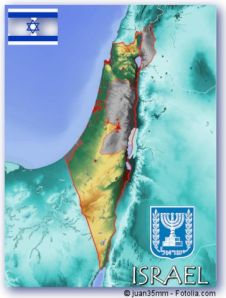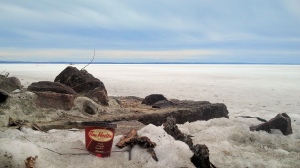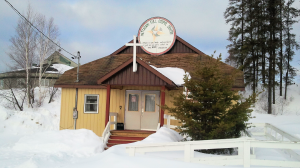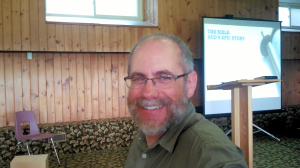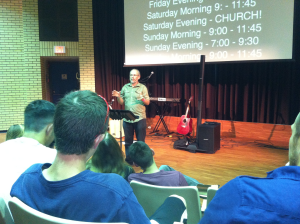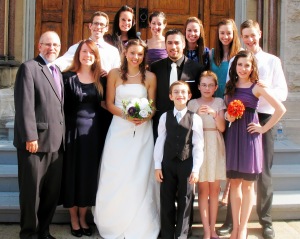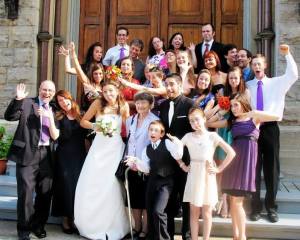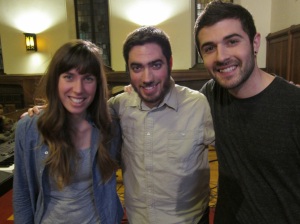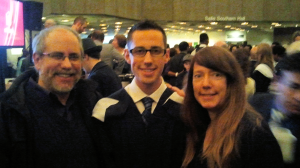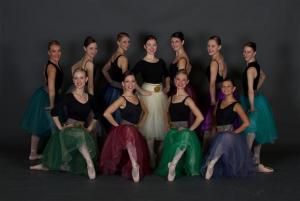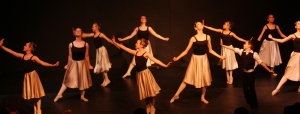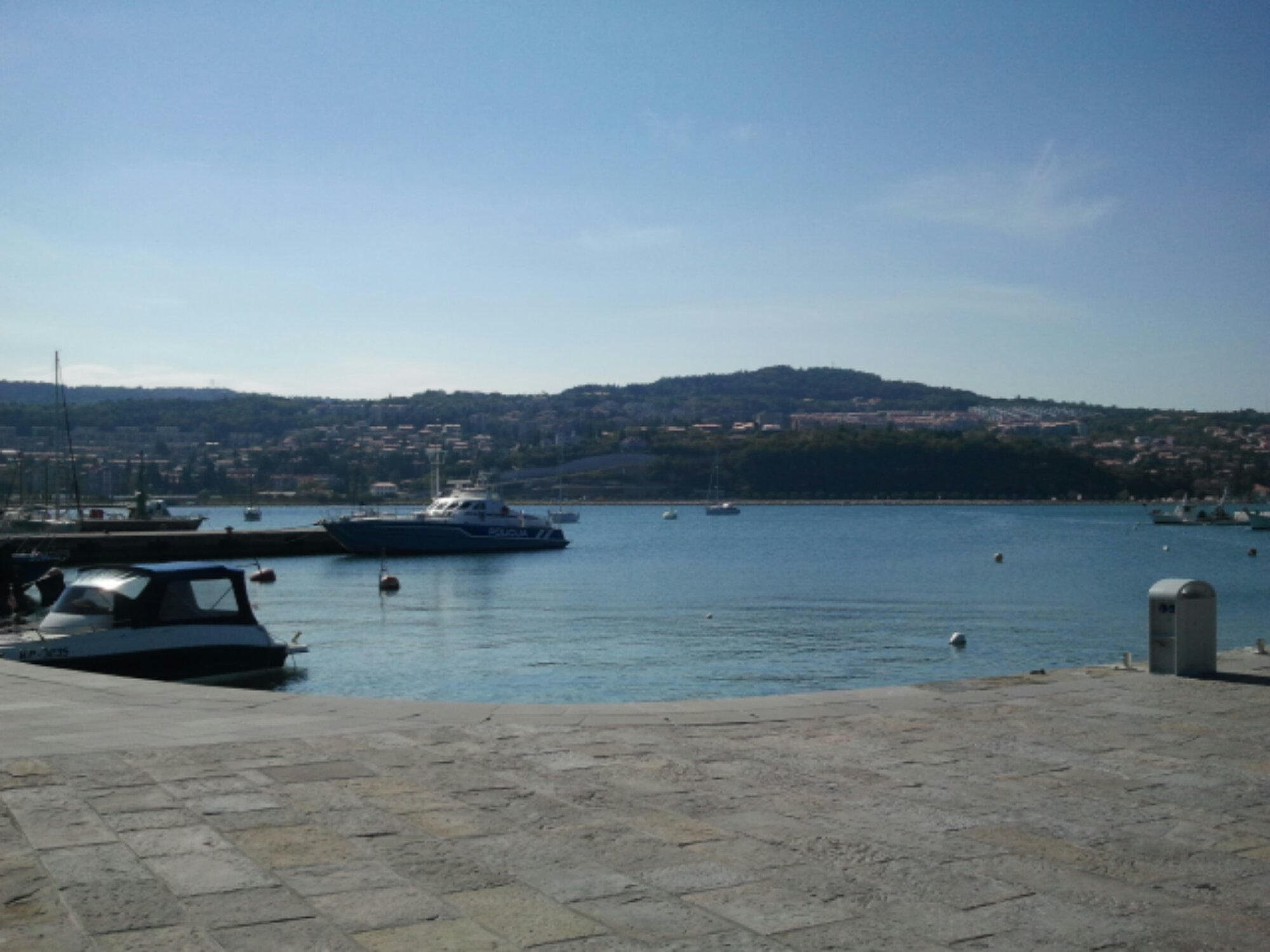This is my reflective report of our recent two-week teaching tour of Parma, Italy and Ljubljana, Slovenia. I try not to rehash too much of what I already wrote above. When I refer to specifics from previous posts, I will provide direct links to them, so you can refer to the details, if you are interested.
Robin and I have had some interesting and intense experiences in life, but I don’t know if anything to this point can compare to these two weeks away. What follows is relatively lengthy, but I could have written much more. So here we go!…
I really didn’t know what to expect as Robin and I prepared for our trip. This would be our first time in continental Europe. We would be with all sorts of people we never met before in cultures we had no experience with and languages we didn’t know.
Our prayer was that we would be a blessing, which happens to be the key concept in the Bible overview seminar I was due to teach. We are so grateful for how he answered that prayer. More than that! Not only did he use us to bless others, we were the recipients of blessing upon blessing.
For years, whenever the topic of visiting faraway places would come up, Robin would always say that she wasn’t interested in seeing the sites. What she wanted to do was connect with the people by visiting in their homes and chatting in cafes. So she was disappointed to learn that we would most likely stay in hotels or similar accommodation rather than with the people. But God had other plans! Due to various circumstances, we stayed with our hosts in both places. This gave us lots of opportunity to get to know them, which wouldn’t have otherwise happened.
Parma, Italy
Upon arrival, it wasn’t long before we began to intensely connect with all sorts of people. You may have already seen this picture of Robin from our first full day in Parma, getting to know a new friend from South Africa. She had lived in Italy for a year many years before and was visiting for a few weeks (click on photo to see larger version):

But it’s this next picture that captures how Robin was feeling in the moment: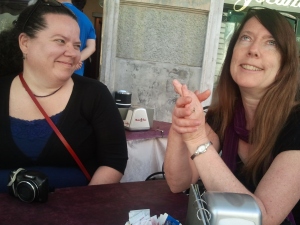
Robin’s thought bubble: I am sitting in a café in Italy getting to share hearts with a new friend, la, la, la, la la!
One morning while I was getting up, Robin was already up and visiting with our hostess. I could hear them talking without making out the details. When I heard Robin heartily laughing, I began to cry with gratitude over how much of a good time my wife was having being blessed and being a blessing.
While we didn’t go with the goal of site seeing, we were constantly overwhelmed (in a good way) by the uniqueness and beauty of wherever we were.
The first place we were taken was in the town of Fornovo, where we were staying (half our south of Parma, which is an hour south of Milan). It was to see an old church built around 900 A.D.:
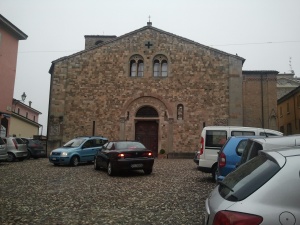
We are not a fan of church buildings, per se, but it was really something to see a building as old as this one. The presence of the cars on the cobblestone streets, driving in narrow passageways added to the special ambience. Here’s one of our Italian host’s quotables: “The cars will drive very close to you, but don’t worry. They won’t hit you.”
We found Italy so…Italian. Here is Robin standing on the balcony of where we were staying:
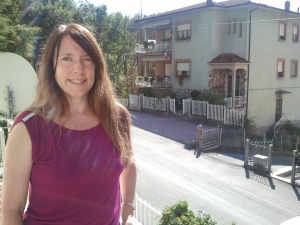
A typical street in Parma:
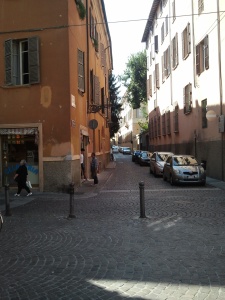
Or how about two naked men wrestling over a fountain by a bike rack?
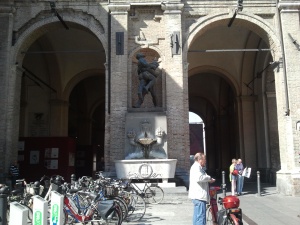
We made so many new friends on our trip!
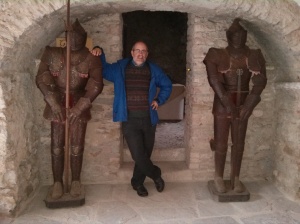
We might disappoint some people that we didn’t see the insides of too many churches or that we only went to one museum. We visited the inside of one church in Parma and quickly walked through another in Venice. Yes, the frescos (paintings on plaster walls) were fascinating. The religious paintings and sculptures were extraordinary (using real gold makes all the difference!). But what really struck me was the exaltation of death. Growing up in Montreal, we are sort-of used to a certain kind of Catholicism, which is not as prevalent in English Canada. But what we saw in Italy and Slovenia was a few notches up the scale. What I teach in my Bible seminar is that God’s plan through Abraham’s descendants and fulfilled in the Messiah is the undoing of death, not a new religion focusing on it. Not only are there massive elaborate and realistic crucifixes everywhere, there were all sorts of dead people buried right in the church itself. In Jewish tradition, not to mention the Bible, death is removed from the community, not brought into places of worship. I wonder what effect this obsession with suffering and death has on a culture.
We did see an amazing mosaic in a church in Parma: the incredible international mix of people of the congregation where I conducted my seminar. Gruppo Cristiano Latino Americano was started by people from the Dominican Republic. The majority of the people there are Latinos from the Caribbean and South America, but the services are in Italian. The young man leading worship Sunday morning was from Brazil (Portuguese being his first language).
The seminar in Parma went really well. It was attended by about 20 people, who seemed to appreciate what I had to share. Pizza was provided for lunch on the Saturday. Everyone had their own box.
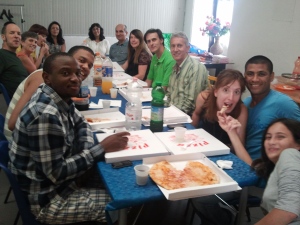
After speaking at the service on Sunday, we went to the pastor’s home for dinner. In Italy one needs to remember that the pasta is not the main course.
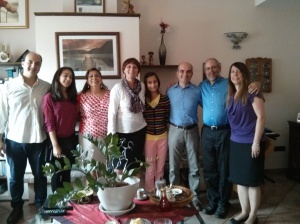
On the left is the pastor of Gruppo Cristiano Latino Americano, Aldo Cerasino with his daughter, Rebekah and his wife, Mariela. Next to me is Francesco Abortivi, the director of Progetto Archippo, the organization that sponsored the seminar. He was also my translator. Next to him is his daughter, Francesca and his wife, Alessia.
Read more of my reflections about this unique community here: http://alangilman.wordpress.com/2013/09/30/blessings-to-the-nations/
Venice, Italy
Squeezed between our times in Parma and Ljubljana, Robin and I had a 44-hour getaway in Venice. It was a short, but much needed, time to ourselves.
Venice is different from anything on earth we have ever experienced. From the canals, to its antiquity, to the number of visitors from all over the world, it was a wonderfully stimulating, but significantly refreshing time.
Here is Robin on the famous Rialto Bridge (which we forgot to take a picture of). On the right you can see a Vaporetto (Water Bus), the main public transit system in Venice. Next to it is a Gondola.
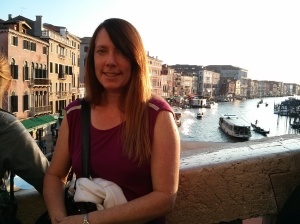
As recounted in the blog, the most significant thing that happened was in the Jewish ghetto and our encountering the group of students from the American School in London. We will never forget the blessing of hearing their teacher speak words of honor about our people in a place of such shame. Read more here: http://alangilman.wordpress.com/2013/10/04/venice/
If you are interested in learning about the Venice Ghetto, a good resource is the Virtual Jewish History Tour of Venice: http://www.jewishvirtuallibrary.org/jsource/vjw/Venice.html
Ljubljana, Slovenia
When the suggestion to go to Ljubljana, Slovenia, first came up, I had to look this country up, since I had never heard of it before. Most people haven’t. Robin was a bit embarrassed when in the introductions to one of my talks there I mentioned this, but it turns out to be something Slovenes are very aware of. Our blog provides a pretty thorough overview of our time there (http://alangilman.wordpress.com/2013/10/08/slovenia/), but here I would like to share more about some of the people themselves.
Our host, Chris Scobie, the pastor of the Ljubljana Pentecostal Church, and his wife, Sabina, were very intentional in setting up times for us to spend with specific people. What a blessing that was! The first evening we were there, Pia, a young lady from the church, had made a gluten-free pie for me (everyone everywhere was so gracious regarding my dietary issues). We thought we were just going to her place to pick up the pie, but instead we were invited into to her third floor walkup (good exercise!) for tea. There it was again: Robin’s wish getting granted)! What a privilege to be invited to a stranger’s (now friend’s) home to get to know each other.
The next day we went with a young couple, Rok (don’t forget to roll the “R”) and Polona, to the town of Bled, one of the most popular destinations in the country. We spent most of the time with me walking with Rok and Robin walking with Polona sharing our lives together.
At one point Rok and I came upon some craftspeople who were selling their wares outdoors. I greeted a lady selling wool products with the Slovene “Dopper dan” (good day). When she responded in Slovene and I told her I just spoke English, she exclaimed with a big smile, “You said ‘Dopper dan’ and you only speak English!” It doesn’t take much to make someone’s day sometimes.

With Rok and Polona at Lake Bled
The next day after the second and final session of my seminar we were taken out by a young lady by the name of Sergeja (remember the “j” is pronounced like the English “y”) for lunch and for a walking tour of downtown Ljubljana. It was the first time I had Chinese food with a side of coleslaw just like Robin makes (the coleslaw, that is). We hardly sat down before Sergeja leaned across the table, looked intensely at Robin and almost demanded, “Explain to me how you do all those children.”
We talked a lot about our family throughout the trip. We would tell them that we are not a typical Canadian, Jewish, or Christian family, and then explain how God has blessed us and has provided for us. God doesn’t provide what we need until we need it. It’s not always easy, but always worth it!
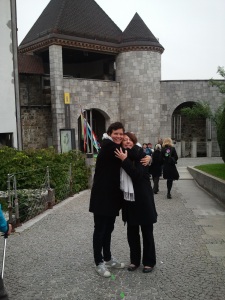
With Sergeja at Ljubljana Castle
One of the things that Sergeja took us to is a plaque in front of the Ljubljana City Hall in downtown Ljubljana. The father of the Slovene language is Primoz Trubar, a Protestant reformer in the 16th Century. The Counter Reformation in Slovenia was very violent and “effective”. All Protestants were expelled from the country, except from a small north-east corner. And they burned all the Protestant books, except for the Bible. While all Slovenes know Trubar as the father of the Slovene language, they are not aware that his motive in establishing the language was so that they could read the Bible.
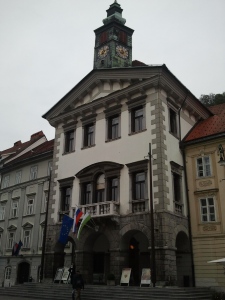
Ljubljana City Hall
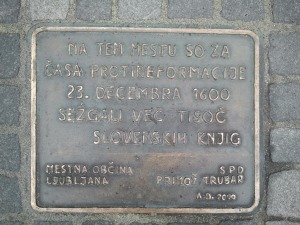
This hard-to-find plaque commemorates the burning of the books in the year 1600.
Hear Sergeja reading the plaque in Slovene and English: http://youtu.be/EIdeyXAIWRA
The next day, Sunday, was one of the busiest days of our entire trip. After speaking twice in the morning, a lunch was prepared for us and a few others at the church. We then spent the afternoon with another young couple, Andrej and Lydia, and their two-month-old son, Elijah. Andrej and Lydia are associated with ACCI as we are and are in process of starting a congregation in the north part of the country.
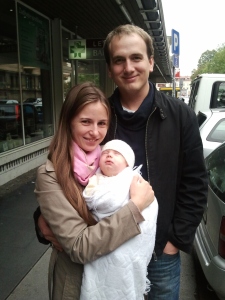
Andrej, Lydia, and baby Elijah
They took us back to downtown, Ljubljana so I could get a picture of the Slovene Parliament building, but I have to admit I was a bit disappointed, since it was so new (technically described as “modernist”).
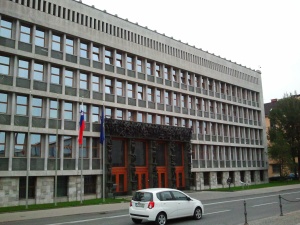
Slovene Parliament
Seeing this building emphasized to me how Slovenia is one of the world’s oldest new countries. While the current republic was officially established in 1991, its history goes far, far back.
I thought the Parliament would look more like this:
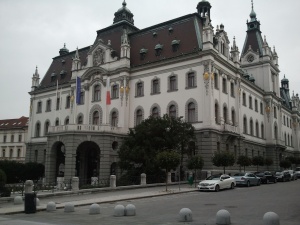
University of Ljubljana
Speaking of far back, after seeing the Parliament, we happened upon some ruins going back to Roman times.
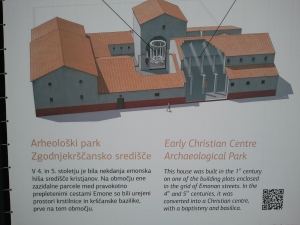
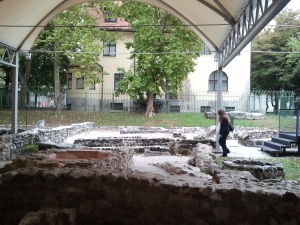
Top: Artist’s conception of what was originally on the site
Bottom: Robin checking out the ruins
Afterwards we headed back to our hosts’ for a brief rest before we went to dinner at the home of some people we met at the church. It was in this in-between time that Robin had a rare experience: She felt “peopled out.” After almost two weeks of almost constant intense, intimate conversation with so many new and delightful people, could it be that Robin was actually peopled out? But we had a commitment, so off we went.
We didn’t want to leave! We spent all evening around the kitchen table of a delightful family of five (Boris and Tanja, 18-year-old Sara, 17-year-old Rebeka, and 13-year-old David), hearing of God’s miraculous work in their lives and getting to know their hearts. How I wish I had a video of Boris telling us how God turned his life away from crime and violence. Among their other interests and involvements, it was really something to learn how they are involved in the only crisis pregnancy center in the whole of Slovenia (http://www.sara-center.com/).
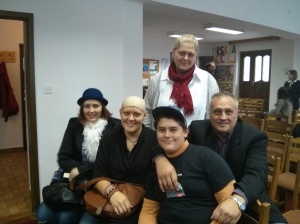
In back: Tanja. In front, left to right: Sara, Rebeka, David, Boris.
What a day, but we weren’t done yet! We were up early the next morning to drive near the coast to a Teen Challenge addiction recovery home for men. I shared with about 12 men there my troubled upbringing of an anxiety-filled life, being abandoned by my father, and my complete self-centeredness as a young person oppressed by continual panic attacks, but that Yeshua completely transformed my life. I told them how my own brother at Robin’s and my wedding told me, “You’ll never make it!”, because he didn’t’ understand the miraculous changes God had made in me. I also explained how at times I too think I will never make it, but whenever I find myself gazing over the pit of despair, God pulls me back again and again. I told them I don’t know why it is more difficult for some than for others, but facing the pain and trusting in God no matter what is worth it.
When I was finished, one of the residents, locked eyes on me. The others were leaving to attend to their duties, but he kept staring at me. So not knowing what to do, I eventually got up and offer my hand to him, but instead we ended up in a warm embrace with him thanking me for what I said. Later I learned that he was only on day four of going off heroin cold turkey. To think that something I said might have encouraged him overwhelms me – just like so much that happened over the previous two weeks.
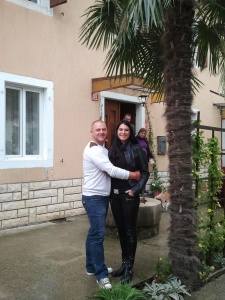
Matjaž and Magdalena Horjak, leaders of Teen Challenge in the town of Nova Vas (yes, that’s a palm tree)
We spent the remainder of our last full day in Slovenia having lunch by the sea and then we needed to pick up Pia, the young lady who made me the gluten-free pie at the beginning of our time there, to take her back to Ljubljana. Again, we thought that we were just going to pick her up, but no. We were invited in to have something to eat and drink and to chat (when God answers a prayer of Robin’s, he really answers prayer!)
Here is one of our last photos of Slovenia taken from Pia’s parents’ balcony overlooking the coastal town of Izola.
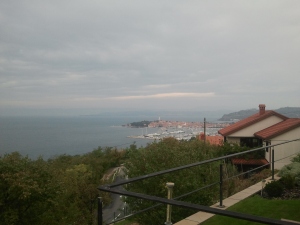
This photo doesn’t fully capture the beauty to the view of a country that surprised us and captured our hearts.
Thank yous
Thank you to our hosts, Francesco and Alessia in Parma, and Chris and Sabina in Ljubljana, Gruppo Christano and the Ljubljana Pentecostal Church for welcoming us so warmly. Special thanks to all the other people who blessed us with their hospitality and generosity in so many ways. To Tony Hedrick of ACCI (http://www.adventive.ca/) who connected us with these places and Anne Hinrichs, also of ACCI, who helped prepare us and encouraged us so much in this new endeavor. Thank you to Matt & Ashlie and Carl & Merry for staying with our kids while we were gone. These two couples enabled us to give ourselves to this time with great peace of mind. Thank you to the various ones who contributed financially to help make this trip possible. And much thanks to those who prayed for us through it all. Most of all, praise be to God for his incredible blessings, for protection for us and our family, for new friends, and amazing surprises everywhere we went.
Bonus story
I wasn’t planning of sharing this, but if you are someone who has gotten this far, you deserve one more story.
We had a 7 a.m. flight from Ljubljana to Frankfurt where we had a four-hour layover before our flight home to Ottawa. The flight to Frankfurt was the only time was sat three across. Every other time it was just Robin and me, window and aisle respectively. When I started chatting with the man next to me, I learned that he worked for a major Slovene book publisher. His job was to secure foreign rights to books in order to publish them in Slovenia. “I have written a draft of a book,” I told him a little sheepishly “that uses baseball as an object lesson of life.” I said this assuming that Slovenes don’t know anything about baseball. But my seat mate replied saying that he had played on Slovenia’s first baseball team and even trained to be an umpire. So we had a delightful time talking baseball and some of the concepts in my book. Perhaps I need to finish it. I think I know who I will sell the Slovene rights to!
These and additional photos are available in Robin’s Europe 2013 photo album (you don’t need a Facebook account to access it): https://www.facebook.com/media/set/?set=a.10152027693018474.1073741825.672958473&type=1&l=b0cfa84c6a


